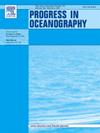Snow crab (Chionoecetes opilio) in the Barents Sea — A passive or problematic invader?
IF 3.8
3区 地球科学
Q1 OCEANOGRAPHY
引用次数: 0
Abstract
The invasion and continued expansion of snow crab in the Barents Sea have provided the area with a new and valuable resource. On the negative side, this invasion may lead to changes in the ecosystem, including structural changes and shifts in energy pathways, as we generally view invaders as a problem. We investigated potential effects of snow crab invasion by applying an end-to-end ecosystem model under different scenarios of fishing and food availability. Overall, the model indicated a low negative impact of snow crab on the ecosystem in the region, also in a potential future with a much higher snow crab biomass. Although snow crab may be found to have local negative effects on specific benthic species, in general it appears that they have found a vacant ecological niche in the Barents Sea ecosystem. In addition, network analysis show that the food web of the Barents Sea becomes slightly more complex when including the snow crab, adding predator–prey interactions. By introducing more parallel foodpaths to the food web, this results in a more resilient ecosystem. Model simulations where the availability of prey to snow crab, and lack of fishing pressure maximizes snow crab abundance result in a somewhat increased impact on the food web. Nevertheless, the effects are still minor and there is no indications that the existing commercial fisheries for other species will be significantly affected. Hence, their role as a passive invader should be considered when structuring management responses.
巴伦支海的雪蟹(Chionoecetes opilio)——被动的还是有问题的入侵者?
雪蟹在巴伦支海的入侵和持续扩张为该地区提供了新的宝贵资源。从负面来看,这种入侵可能会导致生态系统的变化,包括结构变化和能量途径的转变,因为我们通常将入侵者视为一个问题。基于端到端生态系统模型,研究了不同捕捞和食物供应情景下雪蟹入侵的潜在影响。总体而言,该模型表明雪蟹对该地区生态系统的负面影响较小,未来可能会有更多的雪蟹生物量。虽然雪蟹可能会对特定的底栖物种产生局部的负面影响,但总的来说,它们似乎在巴伦支海生态系统中找到了一个空缺的生态位。此外,网络分析表明,当包括雪蟹时,巴伦支海的食物网变得稍微复杂,增加了捕食者-猎物的相互作用。通过在食物网中引入更多平行的食物路径,这将产生一个更有弹性的生态系统。模型模拟表明,雪蟹的猎物可用性和捕捞压力的缺乏使雪蟹的丰度最大化,这在一定程度上增加了对食物网的影响。然而,影响仍然很小,没有迹象显示现有的其他鱼种商业渔场会受到重大影响。因此,在构建管理响应时,应该考虑到它们作为被动入侵者的角色。
本文章由计算机程序翻译,如有差异,请以英文原文为准。
求助全文
约1分钟内获得全文
求助全文
来源期刊

Progress in Oceanography
地学-海洋学
CiteScore
7.20
自引率
4.90%
发文量
138
审稿时长
3 months
期刊介绍:
Progress in Oceanography publishes the longer, more comprehensive papers that most oceanographers feel are necessary, on occasion, to do justice to their work. Contributions are generally either a review of an aspect of oceanography or a treatise on an expanding oceanographic subject. The articles cover the entire spectrum of disciplines within the science of oceanography. Occasionally volumes are devoted to collections of papers and conference proceedings of exceptional interest. Essential reading for all oceanographers.
 求助内容:
求助内容: 应助结果提醒方式:
应助结果提醒方式:


